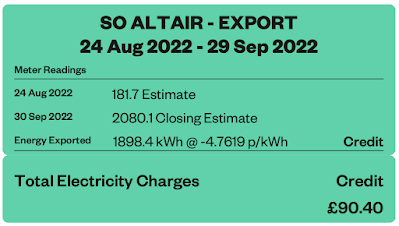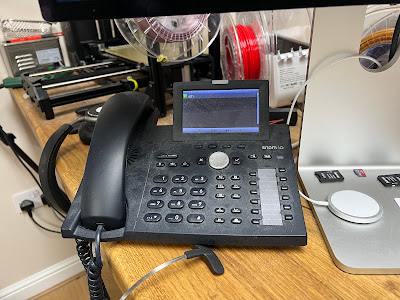This is both simple and complicated...
The simple bit is that old fashioned phone lines, as have been around, providing telephone service, for well over a century, in the UK, are coming to an end. Well, at least the main provider of such, BT, is stopping them.
That is the simple bit, and it really is simple. Even now, in a lot of areas, you cannot now buy a "normal" landline telephone service from BT, or any of the companies that use BT for such services. You can't take over an existing line, or move it to a new provider. This is spreading across the country area by area. The next step, in a couple of years, is that the existing lines stop working.
What's the plan?
When I explain this, I am asked "What's the plan then?", and "What are they [BT] going to do?".
In principle this is an odd question, BT are stopping phone lines. Why do they need a plan? Why do they need to "do anything"? Why do people think BT will do anything? All that is happening is that a company is stopping selling a particular service. Simple as that.
I think people see phone lines as some sort of right, or public service, but it is not. It is just a service that some companies sell. It is also a service which is purchased less and less. So many people use mobile phones these days, and so many people use other means to have a telephone service, which I come on to later. It makes commercial sense for BT to stop selling this service, simple as that. Other providers will follow suit, though a lot of other providers use BT lines so are stopping anyway.
Just to be clear, bits of copper wire in the ground will be around a while longer, but used for broadband, and not have a telephone service. Though this is gradually being changed to glass fibre.
In practice though...
Of course, in practice, BT, and other providers of such services, are not daft. They have a range of other products that will provide "telephone service" by other means, and will be keen to sell them to you.
This is, of course, confusing to a lot of people. No service will be exactly the same, but some will be very close. One of the issues is the fact that telephone exchanges used to have power backup for several hours, and they powered the telephone handset - so phone lines used to work for a while in a power cut. Also, if the power cut was local, at your house but not at the exchange, they worked as long as you like with a power cut. Almost every other service does not have that exact feature. Even if you have batteries yourself, your internet access may not have, or may only work for a short period (batteries in street cabinets, etc). So no service will be quite identical, but in subtle ways people don't always consider (e.g. power fail and calling 999).
There is also the issue that people will ask why they have to buy some new service? Well, they don't, obviously, but the existing service they buy is stopping, so it is up to them what they choose to do.
999
Emergency services are a concern for people - as I mention, batteries may not last very long even if you have them. There was a reported case where someone could not call 999 on their VoIP service as they had no power during a fire. This is sad. But remember 999 on landlines is not a 100% reliable service, that would be impossible. It is very reliable, and the power from the exchange helps, but even that is only for a few hours at most. 999 has always been a service that telephone providers have to provide to the extent technically possible, and they do a good job. But there are always edge cases (a fire could have damaged the phone line and it would not be a news story, it is only a story because it is "change").
One small issues is VoIP is an "over the top" service. It uses an Internet service to work. ISPs have never had to try and provide a service with the same level of reliability for 999 use, nor when no power, and so on, and as they are not providing 999 it is unlikely that will change (if it does, it will be a lot of cost). That said, an over the top service can be made more reliable - you can have have multiple providers and even satellite links. The snag is most people would not want to pay the extra cost for that increased reliability.
Of course, in a lot of cases, a mobile service is also available. Though people forget that these too need power at the cell site, and those sites do not necessarily have battery backup, or backup for very long.
At the end of the day, try to have a battery backup on your shiny new VoIP service if you can, and a mobile if you can, but as I say 999 has never been guaranteed 100% reliable. So think of your options.
What really are the options?
I am not going to go in to a sales pitch here. Obviously we (A&A) sell some of this. But there are a lot of options.
Firstly - do you even need something like a landline telephone service? A lot of people use mobiles, and only even have a landline for broadband. The line for broadband is fine and will continue to exist, just with no telephone service, though obviously you ideally want to be on fibre now, if you can.
Secondly, what does a landline telephone service mean to you exactly?
A telephone number
A key part of the old landline telephone service is the telephone number itself. A lot of people have had a telephone number for a very long time, and people still know it and call it. So receiving calls on a conventional geographic telephone number is important.
- One option is have a company take over the phone number and simply send it to your mobile. There may be some call charges for that.
- One option is a ceased number message telling people your mobile number - possibly forever, or just for a while until you stop the number altogether.
- And finally, there is also the case of having a telephone service on your number using Voice over IP
For businesses that publish a local phone number, keeping it working one way or another is important.
Voice over IP
The basic option for keeping a service on a phone number is Voice over IP (VoIP), which is a telephone service over the internet. You need a reliable internet service, and possibly even a service that somehow manages to make VoIP work well even when your kids are downloading the latest game update at the same time. Different services (for internet) have different features to help with this. Some providers may provide special broadband routers that have built in telephone VoIP services, maybe even working with an old school telephone if you want (bear in mind that it needs power).
For a business, VoIP can offer some fun options with better telephone systems, call queuing, messages, multiple calls at once, diverts, time profiles, all sorts. Just a matter of what kit or service you buy.
Service provider
One choice for VoIP is the service provider. It may be the same as your ISP, or may be totally separate. Just like with a landline or mobile, look at the costs, the terms, the bundles, call costs, and so on. Some may bundle equipment as well. Some may have a minimum term. Some may bundle calls and some may not. Some may even provide call recording. In practice, just like "porting" numbers between mobile providers, you can usually simply port your number between providers if you need.
Equipment
Another issue is equipment. This can be totally separate to the service provider in most cases, but not all. Some service providers provide an internet and telephone service and equipment all in one bundle. In practice it is probably better to have a service provider that provides the telephone service using SIP, which is a standard for VoIP. This then lets you choose different compatible equipment as you wish.
It is however worth ensuring it works well with your ISP - things like NAT (Network Address Translation) and CGNAT (Carrier Grade NAT) can cause issues with VoIP. IPv6 solves a lot of these but then has firewall considerations. There are also issues with full links - as I mention, someone doing a big download may cause calls to break up - as the Internet tends to expect services to adapt to links being full, and voice calls can't do that. So, it is worth considering an ISP that knows how to handle VoIP properly and consider the router you are using on your Internet access carefully.
What do I have?
I have been using VoIP for a couple of decades now - initially internally from a phone system on an ISDN line and then moving the numbers to a VoIP service and ditching landlines around 18 years ago.
On my desk I have a desk phone, like an old push button landline phone. It gets used more than my mobile (I know, I'm old). It has a headset which I like when talking and typing at the same time, and a speaker phone I use some times. It is connected by one cable, a Power over Ethernet lead, to my network switch, and works using SIP. I use a FireBrick as a SIP phone system in the house allowing me to transfer calls, and ring multiple phones at once, and so on (rings my mobile as well).









